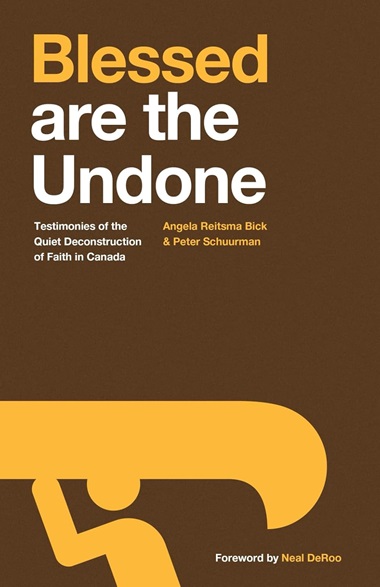 Angela Reitsma Bick & Peter Schuurman. Blessed are the Undone: Testimonies of the Quiet Deconstruction of Faith in Canada (New Leaf Press, 2024)
Angela Reitsma Bick & Peter Schuurman. Blessed are the Undone: Testimonies of the Quiet Deconstruction of Faith in Canada (New Leaf Press, 2024)
Painful as this book will be to many readers, and as problematic as some authorial assumptions appear to be, its essence resonates.
“Truth is, the blessed are often broken people. . . . If the Sermon on the Mount were written today, it might say, ‘you are blessed when you have more questions than answers.” (p. xix)
Blessed are the Undone purports to describe spiritual deconstruction happening in present-day Canada; as Scot McKnight and Tommy Preson Phillips do in Invisible Jesus: A Book About Leaving the Church and Looking For Christ, in an American context.
The substance of this book derives from 28 interview with Canadians, over a two-year span, across denominations. The interviewees ranged in age from 18 – 79, comprised 14 males, 13 females and one non-binary person.
The result, say these authors, is that in Canada “faith is no longer a taken for-granted bulwark against doubt and despair.” (p, 6) Church attendance “has dwindled to less that 11%.”
Self-evidently, people are de-formed in many ways. By definition, in this study deconstruction denotes “faith undone” by which those with an earlier conservative or evangelical embrace of God, the Bible, church and belief in Jesus and the Resurrection, have left behind such religiosity.
Deconstruction “says that everything has a temporary shelf-life and then its value expires.” (p. 58)
Not insignificantly, the authors comment that the more these interviewees were influenced by American religious or political personalities, the greater the urge to deconstruct. (p. 24) – prompting a quote from Marshall McLuhan that “Canada is the only country in the world that knows how to live without an identity.” (p. 25).
Many of these 28 alienated souls recall painful church experiences, including abuse, judgmentalism and unwillingness to consider alternatives to entrenched practices. Specific causes for deconstruction included a rejection that the Christian faith is the only path to God. . . . Or that there is only one way to interpret the Bible.
For some, a restrictive interpretation of the Genesis account did not square with evolutionary science, recalling a C.S. Lewis line: “The Bible now seems in the prisoner’s’ dock, under interrogation.” (p. 78)
Soberingly, for 45% of deconstructors, rejecting Christianity began with the election of Donald Trump as US president. (p. 148),
The despair of some is owing to the duplicity of fallen giants like Ravi Zacharias and Bruxy Cavey of Toronto’s well known Meeting House. Or teachers of a prosperity gospel like Robert Schuller for whom sin reflected poor self-esteem. Some recalled painful parental discipline, consistent with abusive child-rearing counsel from James Dobson.
In Canada the cultural terrain affirms that “Christianity’s cultural moment has waned, and that there are no more free passes.” (p. 160) Any lingering superiority or paternalism must be deconstructed. And certainly, Pastor Google is not an acceptable alternative to earlier esteem for clergy. Because a wilderness is not a place that sustains life for long.
In statistical studies, a core theory of reliability assumes that a sample of 30 approaches a normal distribution of the population being studied. With respect to this study, though – allowing for Canada’s huge immigration influx over the past few years and the complex multicultural character of Canadian society – it is problematic that 28 interviewees adequately are said to account for the results these authors project.
Kudos to Leonard Cohen for reminding us “that there is a crack in everything. And that is how the lights gets in.” This study, though dour, is not devoid of good news. For a “reconstructive path forward . . . God’s words must be paired with God’s works.” (p. 97)
The sum of what these authors heard caused them to conclude that while for the most part, Canadians are parting company with religious affiliation, there remains much to celebrate. The abused are being heard, Indigenous peoples are shaping the agenda and now women can lead worship.
And further, the good news is reflected in “faithful marriages, humble science, repentant churches and healthy ecosystems.” (p. 158) Resurrection life can happen “in the fractured tumble of vulnerable souls.”
David Giesbrecht lives in Abbotsford, where he is involved in a Mennonite church. He has a Master degree in Library Science and was Library Director for almost two decades at Columbia Bible College. He has participated in a variety of community boards over the years and has teaching and library experiences in Nigeria, Jamaica and the Czech Republic.

Blessed Are the Undone is a valuable read. Chapter 20, in particular, gave me new insights into the therapeutic possibilities of sound counselling psychology combined with meaningful spirituality. Excellent approach.
In my work I have encountered and supported many in their journeys out of a truncated ‘christianity’ into a fuller and deeper, meaningful expression of Christian faith based on the liberating power of the Gospel and the power of God’s love to heal and restore new life after a ‘dark night of the soul’ journey.